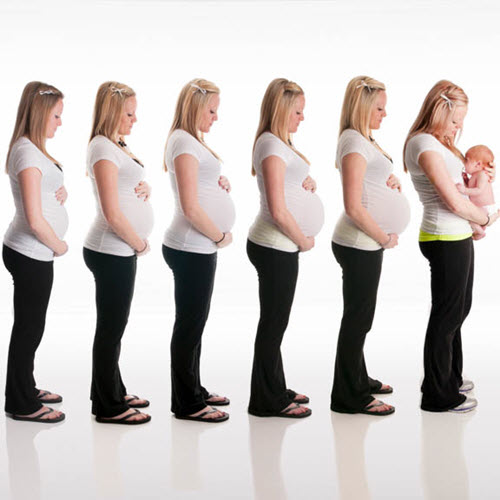Women experience different symptoms during pregnancy. Some symptoms affect more women than others and in different ways. A missed or delayed period if one of the most important pregnancy symptoms for the majority of women.
It is essential to understand the different pregnancy symptoms and signs as some can be related to other issues. Some women have the first experiences just a week or two after conceiving but many feel nothing for weeks and up to a month after conception.
Watch Out for These Early Symptoms of Pregnancy
The early pregnancy symptoms including headaches, nausea, the lower back aching, the breasts becoming tender and missing a period. You should take a home pregnancy test if you suffer from these symptoms and are sexually active.
1. Spotting
When the egg implants in the uterus, it can cause a small amount of bleeding, commonly referred to as spotting. This happens between six and 12 days after conceiving and can also occur with some cramping. This doesn’t happen for all women – if you don’t see it, it doesn’t mean you’re not pregnant. However, this bleeding can occur for the following reasons: a change in menstruation or your actual menstruation, an infection, a change to your birth control or abrasion during intercourse.
2. Changes to Your Menstruation
A missed period is one of the most common symptoms that women suffer from and leads them to test for pregnancy. You should miss your next period but some women find that they bleed during this time. If you do bleed, it will usually be lighter or shorter than your usual period.
Changes to your menstruation occur for other reasons, including fatigue, stress and tension, stopping or missing birth control, hormonal issues, excessive loss or gains in weight, breastfeeding and illness.
3. Suffering from Tender and Swollen Breasts
Tender or swollen breasts can occur just a week or two after conceiving. They could be sore to touch or clothes may become irritable. They may also swell due to hormonal changes and water retention.
However, changes to the breasts can happen for many other reasons, including pre-menstrual, a change or side effect from your birth control pill or an imbalance in your hormone levels.
4. Tiredness and Fatigue
Pregnancy is a tiring time and feeling extra tired or fatigued can occur within the first week of conceiving. However, tiredness and exhaustion happens for many other reasons on a daily basis. Some include being ill, such as the flu or a common cold, depression, stress or trouble sleeping.
5. Pregnancy Sickness and Nausea
This is one of the most well-known symptoms in pregnancy and usually appears between two and eight weeks after conceiving. A small number of women don’t suffer from this at all while some can suffer from pregnancy sickness at all times of the day and throughout the pregnancy. Nausea happens for many reasons including changing your birth control, stomach illnesses, food poisoning and stress.
6. Pain in the Lower Back
Pain in the lower back is common in early pregnancy but many women experience a dull ache for their whole pregnancy. This can also happen for reasons such as back issues, pre-menstrual, strains or stress.
7. Onset of Headaches
Headaches occur with the sudden change in hormones. They also happen because of eye strain, illness, dehydration and withdrawal from caffeine.
8. Needing to Urinate Often
Pregnant women find that between weeks six and eight after conceiving, they need to urinate more often. This could also be because of increasing the amount of fluid you drink, a urinary tract infection or suffering from diabetes.
9. The Areolas Darken
The area around the nipples can darken during pregnancy. This also happens when there are other changes to the hormones or occurred in an early pregnancy.
10. Changing in Food Preferences
Whether you start to crave certain foods or develop aversions from others, changes in your food preferences is an early pregnancy sign. This change can occur for the whole nine months and is different for all women. However, a change in food preferences also occur because of the body lacking in some nutrients, illness, a poor diet, pre-menstrual, depression and stress.
11. Heightened Sense of Smell
A heightened sense of smell, also called hyperosmia, is common in early pregnancy. Smells that were barely noticed before may suddenly become very strong and unpleasant. This is caused by hormonal changes and sensitivity to certain smells. However, illnesses like the flu or common cold can also cause a temporary heightened sense of smell.
12. Constipation
Constipation and bloating often occur in early pregnancy due to hormonal changes slowing down digestion. The rise in progesterone relaxes muscles throughout the body, including the bowels. This allows food to pass through the intestines more slowly. Constipation can also be caused by dehydration, lack of fibre in the diet, or certain medications.
13. Bloating
Feeling bloated is another common early sign of pregnancy. Hormonal changes cause the muscles of your digestive system to relax, slowing down digestion. This allows gas to build up and causes bloating sensations. The rise in progesterone also tells your body to retain more fluid, contributing to that puffy, bloated feeling.
Bloating can also be caused by eating large meals, too much salt or sodium in your diet, swallowing too much air when eating or drinking, or conditions like irritable bowel syndrome.
14. Dizziness
Dizziness or faintness often happens in early pregnancy due to the rise in progesterone. Progesterone relaxes blood vessels, causing a slight drop in blood pressure. Lower blood pressure reduces blood flow to the brain and can make you feel dizzy when standing up too quickly.
Dizziness has other causes like low iron levels, low blood pressure, dehydration, or viral illnesses.
15. Mood Changes
Mood swings such as feeling more emotional or frequent crying spells are common in early pregnancy. Hormones like estrogen and progesterone rise rapidly in early pregnancy, affecting neurotransmitters that regulate mood. Stress and fatigue can also amplify mood changes.
However, depression, anxiety, stress and lack of sleep are other potential causes of mood changes unrelated to pregnancy.
Photo Credit: “It’s only just beginning” (CC BY-SA 2.0) by pilotkip
Zoom Baby is a leading supplier of Pregnancy Tests and Ovulation Test Kits





